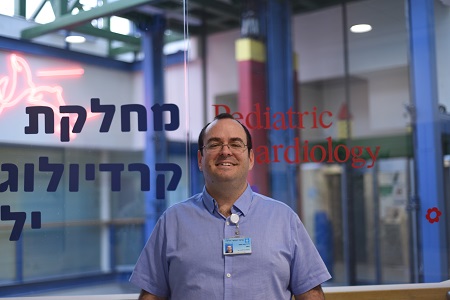
The number of children born with serious heart defects is in decline in the US, Europe, and even in most of Israel. Not so in Jerusalem.
When most parents are told in the second trimester of pregnancy that their baby will be born with catastrophic heart defects, they decide to terminate the pregnancy.
In Jerusalem, because of the religious beliefs of large swaths of the Muslim and Jewish populations, many parents reject abortion, even though it’s legal in such situations. This means many children with severe heart conditions are cared for at Hadassah.
Pediatric cardiologist Asaf Ta-Shma, 43, not only treats them but also is determined to discover the genetic causes of these dangerous conditions, thereby helping to reduce their incidence in Jerusalem.
News of a significant deformation-causing gene called ADAMTS19, discovered by Dr. Ta-Shma with colleagues from Centre Hospitalier Universitaire Sainte-Justine Research Centre in Montreal, was published recently in the prestigious journal Nature Genetics. Working with Hadassah’s head of the Department of Genetics and Metabolic Disease, Prof. Orly Elpeleg, Dr. Ta-Shma has already discovered seven genes related to fetal hearts becoming misshapen and diseased.
His discoveries require examining genes from blood samples within extended families with multiple instances of congenital heart syndromes. In these families, marriage between first and second cousins is common, and a child is likely to get two copies of a founder mutation the parents have received from an ancestor. Despite their desire to avoid disease in their children, couples may hesitate to come to a hospital laboratory for testing because of the stigma. Dr. Ta-Shma, an observant Jew and the son of a famous scholar of rabbinic literature, visits some of the prospective parents discreetly in their Jerusalem homes. An Arab colleague, Dr. Ibrahim Abu-Zahira, does the same in the Palestinian areas. They take blood samples and return to Hadassah to perform whole-exome sequencing, which reveals any mutations.
“Genetics is taboo—people don’t want to talk about it publicly,“ said Dr. Ta-Shma. “We do everything sensitively.”
Couples don’t always know they are genetically related. There are many cases of couples in both Jewish and Arab families who are distantly related because they come from isolated geographical areas and share an isolated gene pool.
“It’s essential to talk about family history, but we have to go beyond that,” says Dr. Ta-Shma. “In 2020, we’re solving mysteries in the genetics lab.”
If one parent is a carrier of a recessive genetic mutation and the other is healthy, their children will be born without the deformation, but half will carry the mutation. If one parent is affected and the other a carrier, each child has a 50 percent chance of being a carrier and a 50 percent chance of having the disease. If both parents carry the mutation but neither is affected, each child has a 25 percent chance of having the mutation on both copies of the gene and possibly being affected, a 50 percent chance to be a carrier of the mutation, and a 25 percent chance not to be a carrier.
Whole exome sequencing in two consanguineous families, each with two affected family members presenting with progressive heart valve disease early in life, revealed mutations in ADAMTS19 in all four affected persons.
Every year, some 10 patient families come to Hadassah with two or more children suffering from serious heart defects.
When genetic mutations are identified, there are three options for avoiding the birth of a child with severe cardiac disease: premarital genetic testing, using preimplantation genetic diagnosis (PGD) to select healthy embryos following in vitro fertilization, and abortion. Among Jewish or Muslim religious families, premarital diagnosis can be done at the matchmaker stage. If the couple is already married or decides to marry despite the high risk of having a child with heart defects, they can then consider IVF and PGD.
Every gene discovery by Dr. Ta-Shma brings the world closer to a decrease in the incidence of hereditary pediatric heart defects.
Because of the unique combination of traditional families and advanced genetics in Jerusalem, Hadassah has become a world leader in genetic research. More than 100 gene mutations have been mapped.
Main picture caption: Pediatric cardiologist Asaf Ta-Shma, gene researcher

